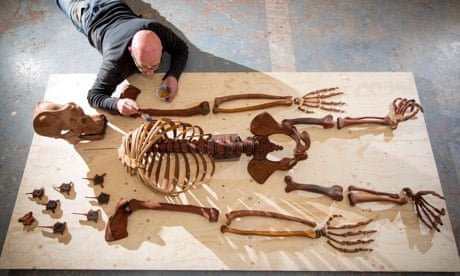Stretched out mournfully on the floor of a studio in Kent, the skeleton of an orangutan lies surrounded by an eccentric circus parade of small animals: elephants and gazelles, crocodiles and lions.
The sculptor Stephen Melton has carved each life-sized bone out of one of the animals, cheap tourist souvenirs he collected from junk and charity shops in Ramsgate. Big bones like the skull and pelvis were made from timber scavenged from skips; the skull was once a fire door.
"In our children's lifetime there may be no more orangutans in the wild, and even in zoos and wildlife parks they may be extinct in 50 years. "
The workmanship in the souvenir animals is often crude, but the timbers – including ebony, teak, iroko and mahogany – are beautiful.
"There is a bitter irony that presumably these things were brought back as souvenirs by people who were interested in wildlife – with no awareness that they were helping destroy their habitat."
Much of Melton's work is inspired by environmental awareness, including pieces using bronze casts of animals killed on roads or shot for sport.
When he realised the carnage among animals in the pet trade, he asked a local shop if he could have any exotics like snakes and lizards that died in their care, but had to call a halt when they were being delivered to his studio two sacks at a time.
The orangutan will be exhibited for the first time at the Art14 fair at Olympia in London next month.
"They are almost family, so close to humans – if we can't save the orangutan, I do wonder what it says about what we are doing to the world," says Melton.
